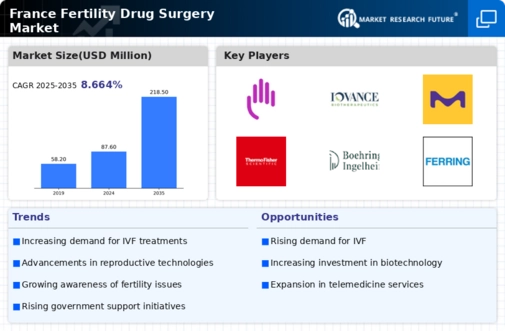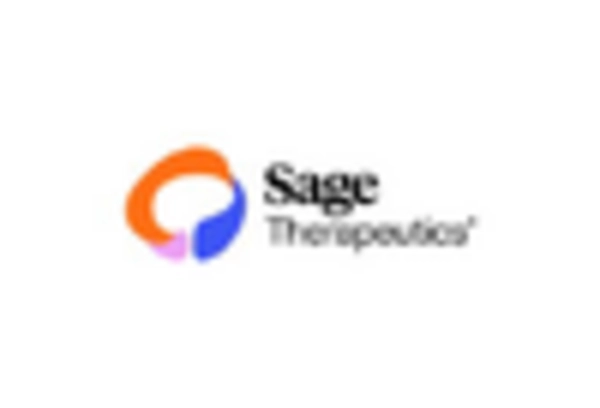Rising Infertility Rates
Rising infertility rates in France are emerging as a critical driver for the fertility drug-surgery market. Recent statistics indicate that approximately 15% of couples in France experience difficulties conceiving, a figure that has been steadily increasing. Factors contributing to this trend include lifestyle changes, environmental influences, and delayed childbearing. As infertility becomes more prevalent, the demand for fertility treatments, including both drugs and surgical options, is expected to rise significantly. This increase in demand is likely to prompt healthcare providers to enhance their offerings, thereby stimulating growth within the fertility drug-surgery market. The implications of rising infertility rates extend beyond individual couples, impacting public health policies and healthcare resource allocation.
Advancements in Medical Technology
Advancements in medical technology are playing a crucial role in shaping the fertility drug-surgery market. Innovations such as improved imaging techniques, minimally invasive surgical procedures, and enhanced drug formulations have transformed the landscape of fertility treatments. For instance, the introduction of robotic-assisted surgeries has led to shorter recovery times and reduced complications, making surgical options more appealing to patients. Furthermore, the market for fertility drugs is projected to grow at a CAGR of 8% over the next five years, driven by these technological advancements. As healthcare providers in France adopt these cutting-edge technologies, they are likely to offer more effective and efficient treatment options, thereby attracting a larger patient base and fostering growth in the fertility drug-surgery market.
Government Initiatives and Funding
Government initiatives and funding aimed at supporting reproductive health are emerging as a vital driver for the fertility drug-surgery market. In France, public health policies have increasingly focused on improving access to fertility treatments, including subsidies for certain procedures and medications. This financial support has made fertility services more accessible to a broader segment of the population, particularly for those facing financial constraints. Recent data indicates that government funding for fertility treatments has increased by 20% over the last two years, reflecting a commitment to addressing reproductive health challenges. As a result, the fertility drug-surgery market is likely to experience growth, as more individuals take advantage of these resources to pursue their family planning goals.
Cultural Shifts Towards Family Planning
Cultural shifts in attitudes towards family planning and reproductive choices are influencing the fertility drug-surgery market. In France, there is a growing acceptance of assisted reproductive technologies, which has led to an increase in the number of individuals opting for fertility treatments. This cultural evolution is characterized by a shift in societal norms, where seeking help for fertility issues is no longer stigmatized. As a result, the fertility drug-surgery market is witnessing a rise in demand, with an estimated 30% increase in treatment inquiries over the past year. This trend suggests that as societal attitudes continue to evolve, the market will likely expand further, driven by a more open dialogue surrounding reproductive health.
Increasing Awareness of Fertility Issues
The growing awareness of fertility issues among the population in France appears to be a significant driver for the fertility drug-surgery market. Educational campaigns and media coverage have contributed to a heightened understanding of reproductive health, leading individuals to seek assistance sooner. This trend is reflected in the increasing number of consultations with fertility specialists, which has risen by approximately 15% over the past few years. As more people recognize the importance of addressing fertility challenges, the demand for both drug and surgical interventions is likely to increase. Consequently, healthcare providers are adapting their services to meet this rising need, thereby expanding the fertility drug-surgery market. This shift not only enhances patient outcomes but also stimulates economic growth within the healthcare sector, as investments in fertility treatments and technologies continue to rise.
















